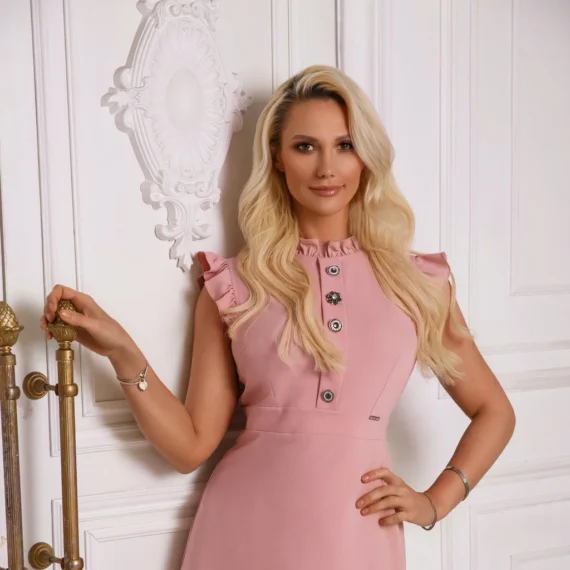
The journey to “I Do” is a unique experience for every couple, but it can be particularly fascinating to explore how this process unfolds in different cultures and societies. In the Czech Republic, a country with a rich history and diverse traditions, the path from dating to marriage has its own distinct characteristics. As we delve into the intricacies of Czech relationships, we’ll uncover the trends, timelines, and cultural influences that shape the way couples navigate their way to the altar.
The Czech Dating Landscape: A Snapshot
Before we explore the specifics of dating durations before marriage in the Czech Republic, it’s essential to understand the overall dating landscape in this Central European nation. Czech society has undergone significant changes in recent decades, with a shift towards more liberal attitudes and a greater emphasis on individual freedom and self-expression.
In the realm of dating, this has translated to a more relaxed and open approach to relationships. Many Czech couples now prioritize personal happiness and compatibility over traditional expectations or societal pressures. This mindset is particularly prevalent among younger generations, who often take their time to explore different relationships and focus on personal growth before settling down.
However, this isn’t to say that Czech society has completely abandoned its traditional roots. Family values, respect for elders, and a strong sense of community remain integral to the Czech way of life. These influences can still shape the way couples approach dating and marriage, particularly in more rural or conservative areas.
Navigating the Numbers: Czech Dating Durations
So, how long do Czech couples typically date before taking the plunge into marriage? While there’s no one-size-fits-all answer, recent studies and surveys provide some interesting insights into the average dating durations in the Czech Republic.
According to a 2019 survey conducted by the Czech Statistical Office, the average length of a relationship before marriage in the Czech Republic is approximately 6.6 years. This figure has been gradually increasing over the past few decades, with couples in the 1990s averaging around 4 years of dating before tying the knot.
Interestingly, this trend towards longer dating periods is more pronounced in urban areas, particularly in the capital city of Prague. Here, couples tend to date for an average of 7.2 years before getting married. In contrast, couples in smaller towns and rural areas generally have shorter courtships, with an average dating duration of 5.8 years.
These numbers paint a picture of a society that values taking the time to build strong, stable relationships before making the commitment to marriage. Czech couples, it seems, are in no rush to walk down the aisle, preferring to focus on personal and professional development, as well as ensuring compatibility with their partner, before taking the next step.
Of course, these averages don’t tell the whole story. Within these broad trends, there is a wide range of individual experiences and timelines. Some Czech couples may feel ready to marry after just a year or two of dating, while others may choose to wait a decade or more before saying “I Do.” Ultimately, the decision to marry is a deeply personal one, influenced by a complex interplay of emotional, financial, and cultural factors.
Factors Influencing Dating Durations in the Czech Republic

While the numbers provide a broad overview of dating trends in the Czech Republic, it’s essential to explore the various factors that influence how long couples choose to date before getting married. These factors range from cultural and societal expectations to personal preferences and life circumstances.
Cultural Influences
Despite the increasingly liberal attitudes towards relationships, Czech society still places a high value on marriage and family. Many couples feel a cultural pressure to marry, particularly as they reach their late 20s and early 30s. This pressure can come from parents, grandparents, or even friends who are already married.
However, the Czech Republic’s strong emphasis on individuality and personal freedom also means that couples are more likely to resist these pressures if they don’t feel ready for marriage. In this sense, the cultural influence on dating durations can be complex and multi-faceted.
Economic Stability
Economic factors play a significant role in determining when Czech couples feel ready to marry. Many couples choose to wait until they have achieved a certain level of financial stability, whether that means completing their education, securing a stable job, or saving up for a home.
The Czech Republic’s strong social safety net, which includes generous parental leave policies and affordable healthcare, can also influence couples’ decision-making. With less pressure to marry for financial security, couples may feel more freedom to take their time and focus on building a strong emotional foundation before tying the knot.
Personal Readiness
Ultimately, the decision to marry is a deeply personal one, and Czech couples are increasingly prioritizing their own readiness over external pressures or expectations. Many couples view their dating years as a time for personal growth, self-discovery, and building a strong partnership.
This emphasis on personal readiness can lead to longer dating durations, as couples take the time to explore their compatibility, work through challenges, and ensure they are making the right decision for their future.
Regional Variations
As mentioned earlier, dating durations can vary significantly between urban and rural areas in the Czech Republic. In cities like Prague, where career opportunities are more abundant and the cost of living is higher, couples may choose to delay marriage in favor of focusing on their professional development.
In contrast, couples in smaller towns and rural areas may feel more pressure to marry earlier, whether due to traditional expectations or a desire for stability in a less dynamic economic environment. These regional variations highlight the complex interplay of cultural, economic, and personal factors that shape dating durations in the Czech Republic.
Age-Specific Considerations
So, when it comes to the whole getting hitched thing in the Czech Republic, there are some age-specific considerations you gotta keep in mind. If you’re a Czech national, and you’re thinking about entering into marriage either with another Czech national or a foreign national, there’s a whole bunch of paperwork you gotta deal with. First off, you’re gonna need to fill out a questionnaire for entering into marriage and submit it to the registry office. You’re also gonna need to provide some documents like a death certificate if you were previously married and your certificate of legal competence to enter into marriage. And if you’re marrying a Czech, any documents from your home country need to be officially translated into the Czech language.
Once you’ve got all your paperwork in order, you’ll need to head to the registry office to sign a protocol on contracting the marriage. This is basically a fancy way of saying you’re signing a contract to get hitched. If your deceased spouse was of a different nationality, then you’re gonna need to go to their embassy and get their death certificate officially translated into Czech. And don’t forget, if you’re marrying a foreign national, they need to have a permanent residence in the Czech Republic to make it all official.
Once everything is sorted, you can start planning your wedding ceremony and celebrating with some good ol’ Czech cuisine. Just make sure all your documents are in order and that you understand Czech because all the official stuff has to be translated into Czech. And if you plan on getting married civil or religious style, you gotta make sure you follow all the rules set out by the Ministry of the Interior. So, get ready for the adventure of contracting the marriage of a lifetime!
Real-Life Insights: Stories from Czech Couples

To truly understand the dynamics of dating and marriage in the Czech Republic, it’s essential to look beyond the numbers and explore the real-life experiences of Czech couples. These personal stories provide a rich tapestry of insights, highlighting the diversity of paths that lead to the altar.
Petra and Tomáš
Petra, a 32-year-old marketing professional, and Tomáš, a 35-year-old IT specialist, met through mutual friends in Prague. They dated for nearly 8 years before deciding to get married, a timeline that Petra describes as “perfectly normal” for their social circle.
“We were both focused on our careers and personal growth when we met,” Petra explains. “Getting married wasn’t an immediate priority for either of us. We wanted to take our time, travel together, and really build a strong foundation before taking that next step.”
For Petra and Tomáš, the decision to marry was a natural evolution of their relationship. They had already navigated challenges together, supported each other’s dreams, and built a life that felt truly shared. When they finally got engaged, it was a celebration of the love and commitment they had nurtured over the years.
Jana and Petr
In contrast to Petra and Tomáš’s urban romance, Jana and Petr’s story unfolds in the picturesque Moravian countryside. They met in their early 20s, introduced by Jana’s cousin at a local festival. Within a year of dating, they were engaged, and they married shortly after Jana’s 24th birthday.
“In our village, it’s still quite common to marry young,” Jana shares. “I always knew I wanted a family, and when I met Petr, I just had this feeling that he was the one. We didn’t see any reason to wait.”
While their courtship may have been shorter than the national average, Jana and Petr’s relationship was no less committed. They navigated the joys and challenges of married life together, supported by a tight-knit community and strong family bonds.
Lukáš and Michal
Lukáš and Michal’s story is a testament to the idea that love knows no timeline. The couple, both in their early 40s, had each been married before. They met through a dating app, bonding over shared experiences and a desire for a meaningful, lasting connection.
“When you’ve been through a divorce, you approach relationships differently,” Lukáš explains. “Michal and I both knew we wanted something real, but we also knew we needed to take our time. We dated for nearly three years before we even started talking about marriage.”
For Lukáš and Michal, the decision to marry was less about hitting a particular milestone and more about affirming the depth and resilience of their love. They took the time to blend their families, to navigate the complexities of their individual pasts, and to build a future that was truly theirs.
These stories, each unique in its own way, paint a picture of the diverse experiences that make up the tapestry of Czech relationships. They remind us that, beyond the averages and statistics, the journey to “I Do” is a deeply personal one, shaped by individual circumstances, cultural influences, and the ineffable magic of love.
Cultural and Societal Influences on Czech Relationships

To fully understand the landscape of dating and marriage in the Czech Republic, it’s crucial to explore the cultural and societal factors that shape these experiences. From traditional gender roles to the impact of the country’s communist past, a complex web of influences underlies the way Czech couples navigate their relationships.
Traditional Gender Roles and Family Structures
Historically, Czech society has been characterized by traditional gender roles, with men as primary breadwinners and women as caregivers and homemakers. While these roles have evolved significantly in recent decades, particularly in urban areas, they still influence the way some couples approach relationships and marriage.
In more traditional families, there may be an expectation for women to marry relatively young and focus on building a family. Men, in turn, may feel pressure to establish financial stability before proposing. These expectations, while not universal, can contribute to the timeline of relationships and the decision to marry.
The Legacy of Communism
The Czech Republic’s communist past also plays a role in shaping attitudes towards relationships and marriage. Under the communist regime, which lasted from 1948 to 1989, the state heavily promoted marriage and childbearing as a way to build a strong socialist society.
While the country has since embraced democracy and individualism, the legacy of this period can still be felt in certain attitudes and expectations surrounding marriage. Some older generations, who came of age during the communist era, may view marriage as a more necessary or inevitable step, rather than a purely personal choice.
Economic and Educational Factors
As mentioned earlier, economic stability is a significant consideration for many Czech couples when deciding to marry. The country’s strong emphasis on education, combined with a competitive job market, means that many individuals choose to prioritize their studies and careers before settling down.
This is particularly true in urban areas, where the cost of living is higher and the pressure to succeed professionally is more intense. Couples may delay marriage until they feel financially secure, whether that means completing advanced degrees, establishing a career, or saving for a home.
The Influence of Religion
While the Czech Republic is one of the most secular countries in Europe, with a significant portion of the population identifying as atheist or agnostic, religion still plays a role in shaping attitudes towards marriage for some individuals.
In more religious communities, particularly in rural areas, there may be a greater emphasis on traditional family values and the importance of marriage as a sacred institution. This can influence the timeline of relationships and the decision to marry, particularly for couples who place a high value on their faith.
Changing Attitudes and Expectations
Despite these traditional influences, Czech society is also characterized by a growing emphasis on individualism, personal freedom, and self-expression. This is particularly true among younger generations, who are increasingly prioritizing their own happiness and fulfillment over societal expectations.
For many young Czech couples, the decision to marry is less about adhering to traditional timelines or expectations and more about building a partnership that feels authentic and meaningful to them. This shift in attitudes is reflected in the increasing average age at first marriage, as well as the growing acceptance of alternative relationship models, such as cohabitation before marriage.
Navigating Modern Dating

In addition to these cultural and societal factors, the landscape of dating and relationships in the Czech Republic is also being shaped by the powerful forces of technology and globalization. From the proliferation of online dating to the influence of international trends, these factors are adding new dimensions to the way Czech couples connect and build their lives together.
The Rise of Online Dating
Like in many countries around the world, online dating has become increasingly popular in the Czech Republic in recent years. Platforms like Tinder, Bumble, and Badoo have made it easier than ever for Czech singles to connect with potential partners, expanding their pool of options beyond traditional social circles.
For some couples, online dating has accelerated the timeline of their relationships, allowing them to establish a deep connection more quickly than they might have through conventional dating. For others, it has provided a way to carefully vet potential partners and take a more measured approach to building a relationship.
The Influence of Global Trends
As a country with a rich history of cultural exchange, the Czech Republic is also being influenced by global trends in dating and relationships. From the popularity of international dating apps to the influence of Hollywood romantic comedies, Czech couples are increasingly drawing inspiration from a wide range of sources.
This globalization of romance has contributed to a more diverse and dynamic dating landscape, with couples embracing a wider range of relationship models and timelines. Whether it’s the growing acceptance of long-distance relationships or the increasing popularity of destination weddings, Czech couples are finding new and creative ways to build their lives together.
Balancing Tradition and Modernity
For many Czech couples, navigating the modern dating landscape means finding a balance between traditional values and contemporary expectations. While some may embrace the freedom and flexibility offered by new technologies and global influences, others may still feel a strong pull towards the familiar rhythms of Czech courtship.
This tension between tradition and modernity is a defining feature of the Czech dating experience, reflecting the country’s ongoing evolution and the diverse experiences of its people. As couples navigate this complex landscape, they are shaping new norms and expectations for what it means to build a life together in the 21st century.
The Diversity of Czech Relationships
Ultimately, the impact of technology and globalization on Czech relationships is a testament to the diversity and adaptability of love. While traditional cultural and societal influences still play a significant role, couples are increasingly charting their own paths, crafting unique stories that reflect their individual values, experiences, and aspirations.
As we’ve seen through the real-life stories of Petra and Tomáš, Jana and Petr, and Lukáš and Michal, there is no one-size-fits-all approach to building a lasting partnership. Instead, each couple must navigate the complexities of the modern world in their own way, drawing on a rich tapestry of cultural, societal, and personal influences.
In the next section, we’ll explore how these diverse influences come together in the decision to marry, examining the factors that Czech couples consider when taking this significant step. From practical considerations to emotional readiness, we’ll provide a comprehensive look at the thought process behind saying “I Do” in the Czech Republic.
Deciding to Say “I Do”: Key Considerations for Czech Couples

As we’ve explored the various cultural, societal, and personal influences that shape dating and relationships in the Czech Republic, it’s clear that the decision to marry is a complex and deeply individual one. For Czech couples, taking this significant step involves weighing a wide range of factors, from practical considerations to emotional readiness.
Financial Stability and Career Development
One of the most significant considerations for many Czech couples when deciding to marry is financial stability. In a country with a strong emphasis on education and professional development, many individuals choose to prioritize their careers before settling down.
This is particularly true in urban areas like Prague, where the cost of living is higher and the job market is more competitive. Couples may delay marriage until they feel financially secure, whether that means completing advanced degrees, establishing a stable career, or saving for a home.
Emotional Readiness and Personal Growth
Beyond practical considerations, Czech couples also place a high value on emotional readiness and personal growth when deciding to marry. Many view their dating years as a time for self-discovery, building a strong partnership, and ensuring that they are making the right decision for their future.
This emphasis on personal readiness is reflected in the increasing average age at first marriage in the Czech Republic, as couples take the time to explore their compatibility, work through challenges, and build a solid foundation for their life together.
Family Expectations and Societal Pressures
While personal readiness is a key factor, Czech couples also navigate a range of external pressures when deciding to marry. Family expectations, particularly from older generations, can play a significant role in shaping the timeline of relationships.
In more traditional families, there may be an expectation for couples to marry relatively young and start building a family. These expectations can be particularly strong in rural areas, where traditional values and gender roles may be more entrenched.
Societal pressures, such as the perceived stigma of being single in one’s 30s or 40s, can also influence the decision to marry. While these pressures are less pronounced than they once were, they can still shape the way couples approach their relationships and the expectations they place on themselves.
Compatibility and Shared Values
Ultimately, for many Czech couples, the decision to marry comes down to a deep sense of compatibility and shared values. Beyond the practicalities of financial stability and societal expectations, couples must feel confident in their ability to build a life together that is fulfilling, supportive, and authentic to who they are.
This compatibility can take many forms, from shared interests and hobbies to a common vision for the future. It may involve navigating differences in background, religion, or personal beliefs, and finding ways to build a partnership that honors and respects these differences.
The Role of Love and Romance
Of course, no discussion of the decision to marry would be complete without acknowledging the central role of love and romance. While practical considerations and societal influences undoubtedly shape the path to marriage, it is ultimately the deep emotional connection between two people that drives the desire to build a life together.
For many Czech couples, this love is the foundation upon which all other considerations rest. It is the spark that ignites the journey of dating, the glue that holds a relationship together through challenges and changes, and the light that guides the way to a shared future.
Critical Aspects to Consider Before Marriage

Before you enter into marriage, there are a few critical aspects to consider. First and foremost, you need to gather all the necessary documents, such as a death certificate if you were previously married and your previous marriage ended due to the death of your spouse. You will also need to fill out a questionnaire for entering into marriage and submit it to the registry office. If you or your partner is a czech national, you must obtain a certificate of legal competence to enter into marriage from the foreign police or the Ministry of the Interior.
It’s essential to discuss your relationship dynamics, how you handle conflict and communication, your views on religion, and if you want to have children before tying the knot. You also need to ensure you share shared interests and values, have sexual compatibility, and are on the same page financially. Leaving the honeymoon phase is necessary to face reality together.
Marrying a czech or a foreign national in the Czech Republic requires specific documentation, including an officially translated contract of contracting the marriage and proof of residence in the Czech Republic. Make sure all documents are correctly translated into the czech language before your wedding ceremony. It’s crucial to understand czech cuisine and customs if you intend to enter into marriage with a czech national.
Crafting a Unique Path: The Diversity of Czech Marriages
As we’ve seen, the decision to marry in the Czech Republic is shaped by a complex interplay of cultural, societal, and personal factors. While there are certainly common threads and influences, each couple’s journey to the altar is ultimately a unique reflection of their individual circumstances, values, and aspirations.
This diversity is perhaps the most striking feature of Czech marriages today. From the traditional to the unconventional, from the carefully planned to the spontaneously celebrated, Czech couples are crafting their own paths to “I Do,” drawing on a rich tapestry of influences and experiences.
For some, this may mean a classic church wedding, surrounded by family and steeped in centuries of tradition. For others, it may be a intimate civil ceremony, reflecting a more modern and individualistic approach to love and commitment. Still others may choose to forgo marriage altogether, building a life together on their own terms and timelines.
Regardless of the path they choose, what unites these diverse couples is a shared commitment to building a partnership that is authentic, meaningful, and deeply personal. In navigating the complexities of the modern world and the intricacies of their own hearts, they are shaping the future of Czech relationships – one unique love story at a time.
Conclusion: Embracing the Journey to “I Do”

Throughout our exploration of dating before marriage in the Czech Republic, we’ve uncovered a rich and complex landscape of influences, expectations, and personal stories. From the historical and cultural factors that shape the path to the altar, to the modern forces of technology and globalization that are reshaping the dating scene, we’ve seen how Czech couples navigate a wide range of considerations on their journeys to “I Do.”
And so, to all the Czech couples who have embarked on the journey to “I Do,” and to all those who will follow in their footsteps, we offer our heartfelt wishes for a lifetime of love, growth, and happiness. May your unique paths be filled with the richness of shared experiences, the warmth of deep connection, and the enduring strength of a love that knows no bounds.
In the end, the journey to “I Do” is not just a path to a wedding day, but a journey of the heart – a journey that, in all its diversity and complexity, reflects the very essence of what it means to be human. And in embarking on that journey, Czech couples are not just building their own lives, but contributing to the ongoing story of love that defines us all.
So let us celebrate the journey to “I Do,” in all its forms and expressions. Let us honor the courage and commitment of those who navigate its twists and turns, and let us cherish the love that guides them on their way. For in that love, we find a powerful reminder of the very best that we can be – as individuals, as partners, and as members of the human family.






















